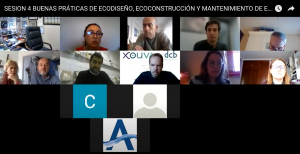On 14 and 15 April 2021, AGAN+ organized, as part of the CAPITEN project, a BtoB conference related to the nautical industry and the circular economy following its work in WP6. In this connection, and in collaboration with partners CIM Alto Minho and CETECIMA, a study was conducted on the deconstruction of fiberglass recreational boats.

This preliminary study included aspects such as the legal environment and the state of knowledge, analysing and identifying all the agents involved, and experience with deconstruction, primarily in Europe.
In addition, a previous survey has been prepared and will be sent to all the agents involved in order to ascertain the current status of all those aspects that are relevant for completing the analysis already conducted.
The previous analysis concludes that we are facing a process that involves industrial activity in the port area, but which can also be extended to industrial zones and recycling centers in general. In addition, certain assumptions are put forward:
- Ships abandoned for destruction represent an unregulated market;
- Fiberglass is a polluting material at the end of its useful life;
- Deconstruction is a costly process;
- There is a legal vacuum in Spain, in reference to this specific aspect that is limited to the application of the laws of waste and that, for the most part, apply to ships which are larger than this type of vessel.
All this implies that the process is not sufficiently viable to attract fiberglass boat owners, associations and the waste recycling and re-evaluation industry without financial support from the corresponding administrations.
In view of the above, different entities that could contribute their knowledge on the subject, not only in relation to deconstruction but also to eco-design, eco-construction, periodic maintenance of boats and the circular economy, were invited to the conference.
The participating entities were: CAPITEN project partners, logistics operators, nautical associations from France, Spain and Portugal, University of A Coruña, School of Engineering of the Basque Country, business associations, architecture and naval engineering companies from Galicia, Valencia and Portugal, experts in financing European projects on circular economy issues, training and legislation from Catalonia and, finally, companies focusing on the circular economy and innovation in recycled materials from the Basque Country and the Valencian Community.
General conclusions
As a general conclusion of this workshop, the following is established: the development of an ecosystem of transition from innovation to the circular economy in industry and nautical activity in the 4.0 environment.
This is supported by:
- The establishment of legal frameworks and standards for the harmonization of investments within the European Union.
- The development of commercial initiatives with a “green business” reputation, given the many sectors that generate fiberglass waste in the different industries: nautical, aviation, automotive, wind energy, etc.
- The promotion of cooperation between all the agents involved in the different processes, the nautical sector in general, innovation agencies and public and private research centres, and the Administration.
- This action represents a great opportunity for job creation at different stages of the process, from design, construction, recycling and reuse of all the resulting materials.
Recordings from the different sessions are available below (in Spanish):
- Current status of the deconstruction of recreational fiberglass boats: successful experiences in Europe
- Legislation and public incentives for the deconstruction of recreational fiberglass boats
- Innovations on deconstruction of recreational fiberglass boats in Spain
- Good practices of ecodesign, ecoconstruction and maintainance of recreational boats from an environmentally respectful approach
- Circular economy: business model and feasibility
